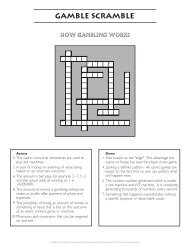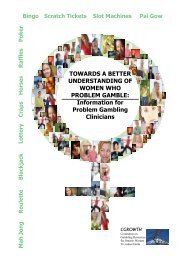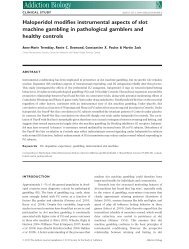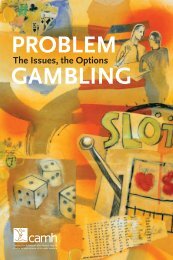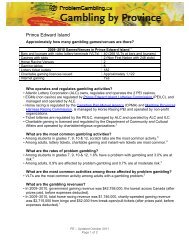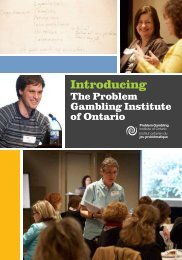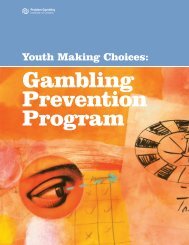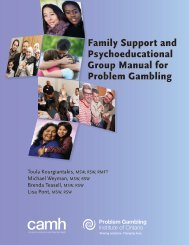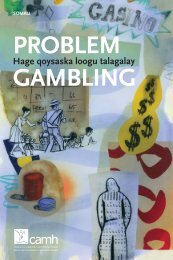Problem Gambling: A Guide for Helping Professionals
Problem Gambling: A Guide for Helping Professionals
Problem Gambling: A Guide for Helping Professionals
You also want an ePaper? Increase the reach of your titles
YUMPU automatically turns print PDFs into web optimized ePapers that Google loves.
Introduction to <strong>Gambling</strong><br />
1. “Normal” problem gamblers are people whose entry into problem<br />
gambling is linked to environment and learning. It may have<br />
stemmed from an early win or cognitive distortions about true<br />
odds and probabilities. The gambler does not necessarily have<br />
pre-existing psychological problems.<br />
2. “Emotionally vulnerable” gamblers are people whose entry into<br />
problem gambling results from their difficulty in managing stress<br />
or crisis in their lives. They use gambling as an emotional mask<br />
and a way of avoiding underlying issues and current stresses.<br />
3. “Biologically based” gamblers are people who have impulse disorders,<br />
such as adhd, and are the most challenging in terms of treatment<br />
success. <strong>Gambling</strong> can also trigger other binge behaviours and,<br />
according to Blaszczynski, these people should receive counselling<br />
to deal with impulse control and should also explore antidepressant<br />
and other medication options with a psychologist or psychiatrist.<br />
<strong>Problem</strong> <strong>Gambling</strong> Affects People Differently<br />
Not all people who gamble excessively are alike, nor are the problems<br />
they face. People with gambling problems are found in all age groups,<br />
income groups, cultures and jobs. Some people develop gambling<br />
problems suddenly, others over many years. There are many reasons<br />
why a gambling problem may develop. For example, some people<br />
develop problems when they try to win back money they have lost, or<br />
because they like to be “in the action.” Others have many life stresses<br />
that make gambling a welcome relief.<br />
Risk Factors<br />
There are risk factors that can contribute to the development of gambling<br />
problems or make it more difficult to stop. People are more at risk if they:<br />
• have an early big win (leading to false expectations of future wins)<br />
• have easy access to their preferred <strong>for</strong>m of gambling<br />
• hold mistaken beliefs about the odds of winning<br />
• do not take steps to monitor gambling wins and losses<br />
15





